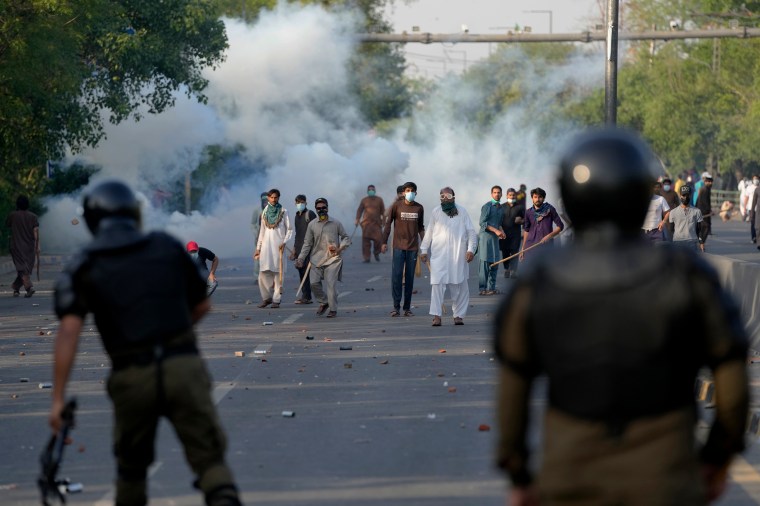New York, May 24, 2023—Pakistani authorities must cease harassing journalists covering the country’s political unrest and respect the media’s right to report freely and safely, the Committee to Protect Journalists said Wednesday.
Since May 16, police have visited the homes of at least three journalists who reported from the scene of a May 9 protest and attack on an army corps commander’s residence, according to news reports, a statement by the Lahore Press Club reviewed by CPJ, and journalists who spoke to CPJ.
On Tuesday, May 23, the Lahore High Court ordered authorities to cease harassing journalists and media workers who reported from the May 9 protest following a joint petition, according to news reports and one of the petitioners, freelance journalist Shahid Aslam, who spoke with CPJ by phone.
“Pakistani authorities must abide by the Lahore High Court’s order and immediately end the harassment of journalists who reported on recent political gatherings,” said Beh Lih Yi, CPJ’s Asia program coordinator. “It is crucial for journalists to keep the public informed about the country’s political situation. Authorities must ensure journalists are safe to do so without the fear of surveillance and harassment by law enforcement.”
Following the arrest of opposition Pakistan Tehreek-e-Insaf party chairman and former Prime Minister Imran Khan on May 9, PTI supporters demonstrated outside the army corps commander’s residence in eastern Punjab province’s capital city of Lahore, broke through the gates, and set fire to the premises.
Shahid Aslam
Police were stationed outside Aslam’s Lahore apartment from May 16 to May 22, he told CPJ, adding that officers asked his roommate at least three times about the journalist’s whereabouts and looked through his windows to check if he was present while he was away reporting in Islamabad, the capital.
Aslam reported on the May 9 protest for his political affairs YouTube channel Xposed with Shahid Aslam, which has over 55,000 subscribers. He told CPJ that a senior Lahore police official informed him that he was not wanted in any specific case and had been identified through geofencing, the practice of identifying all active mobile phone numbers in an area.
Jahangir Hayat
On the evening of May 17, two men in police uniforms and six in plainclothes arrived at Hayat’s home in Lahore, according to Lahore Press Club President Azam Chaudhry and Hayat, chief reporter for the privately owned newspaper Daily Business, both of whom spoke with CPJ by phone. The men did not present a warrant but claimed the journalist was wanted for serious criminal offenses, including murder and kidnapping. They then punched his face, breaking his front teeth, and hit his hand with an iron rod, Hayat told CPJ, adding that the men also shoved his 13-year-old son, leading him to hit his head on a motorcycle, and pushed his wife in the chest.
Hayat, who reported about the protest on his political affairs YouTube channel BoldNews42, which has more than 5,000 subscribers, told CPJ that he and his family later took refuge at the Lahore Press Club.
On May 18, while Hayat and his family remained at the press club, authorities raided the journalist’s home searching for him and broke down its iron doors, he said. Hayat and his family returned home on May 21 after Chaudhry contacted multiple senior Lahore police officials, one of whom informed him authorities would open an inquiry into the attack, the two journalists told CPJ.
Sarfraz Ahmed Khan
Between May 21 and 23, police made about 10 visits to the Lahore home of Khan, deputy bureau chief of the privately owned broadcaster GNN. They searched the premises and police officials repeatedly called Khan to tell him an arrest warrant had been issued for him under the Anti-Terrorism Act, according to news reports and the journalist, who spoke to CPJ by phone. Officers also searched the nearby home of Khan’s friend on May 21, claiming the journalist was hiding there.
A police document reviewed by CPJ showed that the journalist was present at the May 9 protest and was identified using facial recognition software. The document also listed personal details, including his address, and was leaked online, leading the journalist to fear for his safety, he told CPJ.
On May 22, the Punjab police posted a statement on Twitter claiming that Usman Anwar, inspector-general of the Punjab police, had given orders that no innocent citizen, including journalists, would be punished for the attack on the army corps commanders’ residence, and that the issue with Khan had been resolved.
However, on the evening of May 23, police again arrived at Khan’s home, but left after confirming that a senior Lahore police official had issued an internal letter protecting the journalist from harassment, Khan told CPJ.
Separately, on Monday, police failed to present journalist Imran Riaz Khan at the Lahore High Court for a third time following his May 11 arrest. The journalist has been missing since May 11 after police claimed to have released him, his lawyer Azhar Siddique told CPJ by phone.
CPJ’s calls and messages to Punjab Police Inspector-General Usman Anwar and Lahore Capital City Police Officer Bilal Kamyana received no response.
[Editors’ Note: The ninth paragraph was updated to correct Hayat’s remarks and the penultimate paragraph has been updated to correct the date of the hearing in Imran Riaz Khan’s case.]
